
STUDENT NEWS

DAY 2
FINAL EDITION
That’s a wrap on Buhmun 2024
Students have gained global perspectives, collaboration skills and built future aspirations.
USA under fire
Divisions have formed in the Security Council, with the room split in their support for USA.
CUBA comes under fire
Cuba comes under fire
BY Jayden Joury and Andre Duque
Cuba was accused of “defying UN principles” in Committe Room 1. The Cuban delegation came under heavy fire as they proposed a new ICRF (International Climate Recovery Fund) which would primarily operate as a relief fund for affected member states of climate change induced natural disasters.
The criticism comes as the Asia Pacific regional group stated the idea of forcing countries to pay a portion of their GDP for “membership” is heavily problematic and defeats the purpose of international aid.
The delegate for Japan (seen below, left) referred to Cuba as “money driven,” going on to proclaim that “we’re focused on solutions, not money.”
The ICRF was denounced, with member-states such as South Sudan, Uganda, Japan and the Philippines joining forces during informal debate and taking a strong stance against the proposal.
“You don’t have to solely focus on recovery,” explained the delegate for Uganda, stressing the importance of prevention. “Rich countries don’t understand.” This sentiment was shared by many other nations such as the Philippines, who described the new funds as “irrelevant”.
In response to Cuba’s and the Latin American regional group’s proposition, the Asia Pacific countries proposed an alternative which entails several additions to an existing UN international aid fund. In response to Cuba’s controversial proposition, the African regional group voiced their opposition to Cuba’s solution and a Southern Sudanese delegate accused the Cuban delegates of being “egotistical” and later going to say that they do not believe that “Cuba does not know what they are doing” and should “get their priorities straight”.
Uganda told journalists that “Cuba is irrelevant” and is “defying UN principals” by entertaining the idea that aid should be made in an insurance scheme style with paid membership.
But a compromise with the Asia Pacific regional group and Cuba was reached. Countries agreed to utilise an existing UN aid fund to provides short term alleviation for climate crisis affected countries and invest their development of infrastructure and education to foster a population aware of the importance of renewable energy.
This agreement between the two countries has now allowed progress on a resolution to be propelled towards reaching a general consensus.
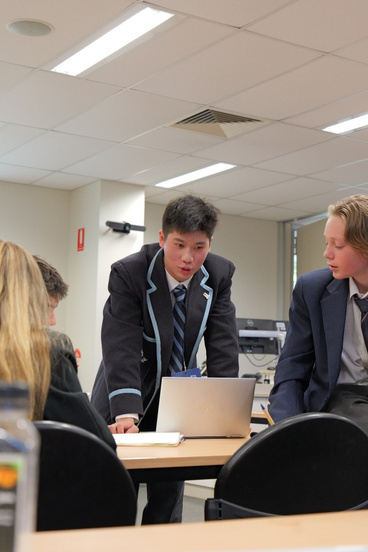
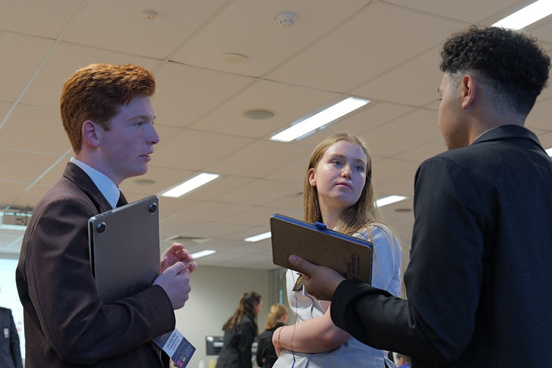
Final Wrap – Committee Room 1
BY Shivani Whala and Allegra Nutley
A controversial proposal emerged in Committee Room 1 - the abolition of Germany as a nation.
This odd suggestion, likely rooted in historical tensions or a desire to stimulate discussion, immediately caught attention and sparked debate.
Meanwhile, Uganda asked Sweden for financial assistance to improve its public transport infrastructure.
This highlighted the economic discrepancies between nations and underscored the importance of international cooperation in addressing development challenges.
In summary, Committee 1 at BUHMUN experienced a mix of slow beginnings, contentious proposals, and diplomatic intrigue. All conflict was finally resolved after completing the resolution.
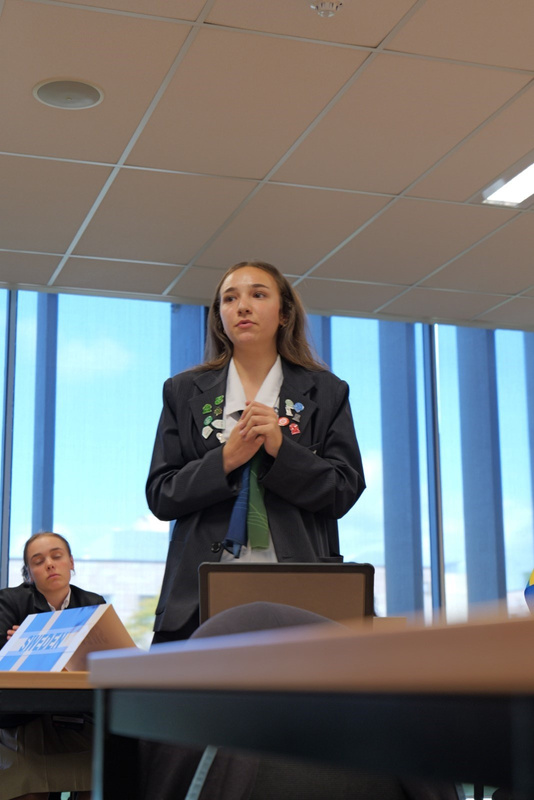
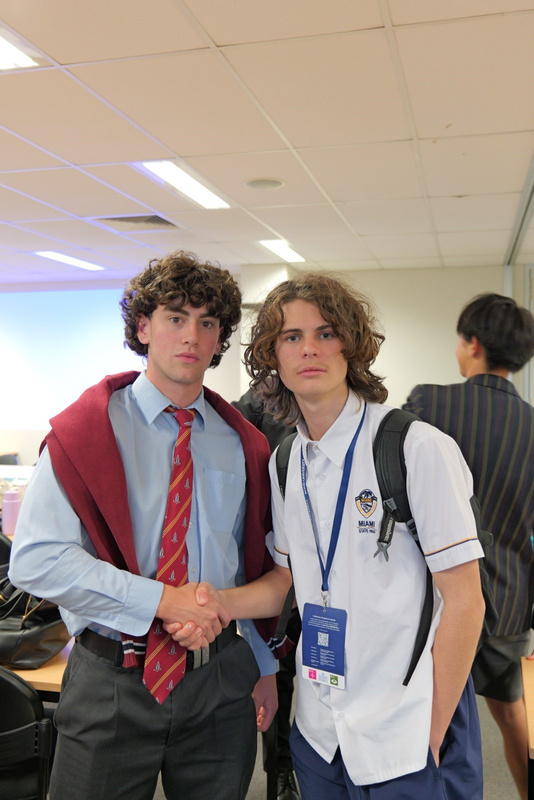
Pictured: The delegate for Sweden addressing the committee).
Pictured: the delegates for Germany (left) and Uganda (right)
Success in Committee Room 2
BY Ayati Gor and Beau Keating
BUHMUN 2024 was a success for committee room 2, with the delegates coming to a sustainable and equitable solution to the Sustainable Development Goals (SDG’s) 10 and 13.
The focus for committee room 2 was climate resilience and inclusive development and the delegates came up with solutions that considered all nations.
At the beginning of the conference many delegates gravitated towards Serbia and the policies they put forward, however, towards the end many of them changed their opinions and started to lean towards Germany’s ideas.
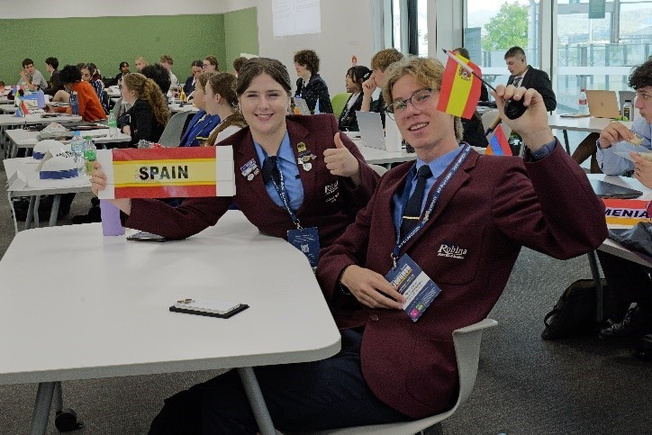
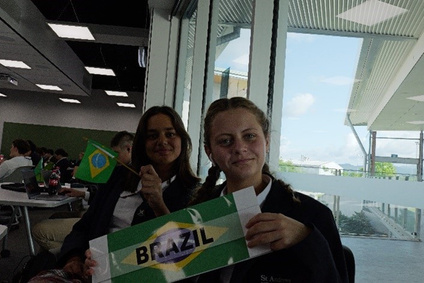
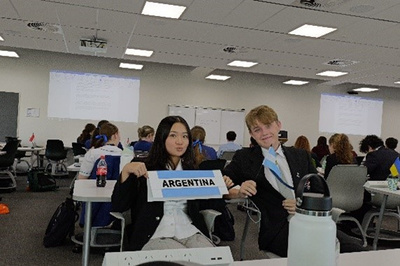
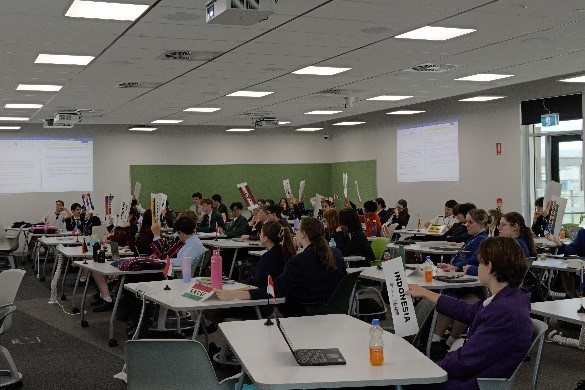
Final Wrap Committee Room 3 Consensus
BY Ghil Grant
The curtains are closing on the 2024 BUHMUN assembly, and committee room 3 seemed a world away from others.
Whilst other committees spiralled into ‘controlled chaos’, committee room 3 maintained diplomacy and consensus, with respectful debates over prominent issues, particularly concerning Sustainable Development Goals 10 and 13.
From discussions of mitigation strategies to the adoption of renewable energy sources in lieu of traditional coal and gas, delegates delivered composed and rational proposals, and collaborated to collectively grapple with climate change and its effects.
While occasional disagreements on precise practices to achieve this arose, delegates navigated social, economic, and political differences to collectively work towards net zero.
However, this consensus and diplomacy showed some cracks, with geopolitical tensions rising, particularly between Western Europe and other delegates.
But through the pursuit of collaboration, core values of the United Nations, delegates put aside their differences to allow for harmonious problem solving and collective logical thinking to prevail.

Resolution in Committee Room 4
BY Molly Crocket, Lucy Matus, Nicholas Hammett and Tom Harris
While Turkey proposed reducing coal consumption by seeking energy assistance from Ukraine, Ukraine sought to prioritise domestic security over international climate aid.
This sparked tensions between the two countries.
Thailand and Turkey proposed climate taxation to fund environmental initiatives met with criticism from Spain and Hungary.
Concerns were raised over taxing key industries and its impact on economic growth, particularly in developing nations.
Developing nations emphasised the need for resources over incentives.
Latvia's plea for funding from the Netherlands for a seawall project highlighted the collaborative approach needed to combat climate challenges.
Thailand's pursuit of hydropower conflicted with Serbia's landlocked geography, showcasing the complexities of renewable energy strategies in diverse contexts.
They made their final resolution, establishing strategies to navigate funding responses to the climate crisis.
These include creating global climate fund specifically dedicated to supporting developing nations, as a proportion of the country’s GDP.
They also are going to make developed nations contribute to the energy independence of all nations. Lastly, they introduced a carbon tax on all countries.
Ultimately, the delegates of Committee 4 worked to a successful resolution.
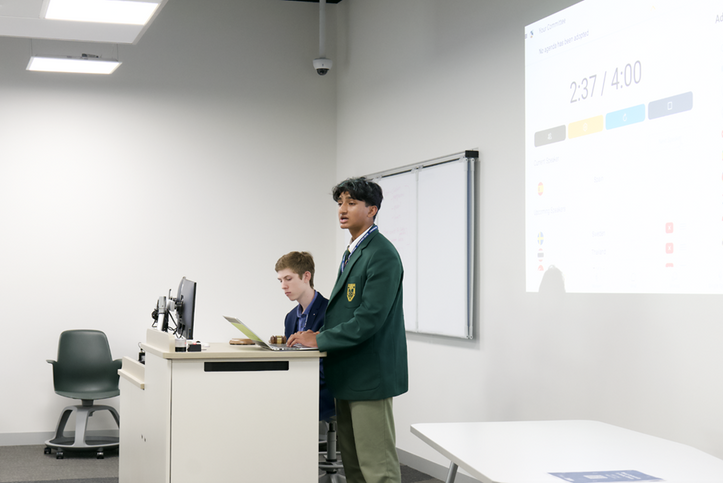

STUDENT NEWS

DAY 2
3.30PM EDITION
clash of the titans
The second day of the BUHMUN conference commenced, with delegates coming together to solve climate change and gender inequality.
political games in security council
Division is ripping through the security council, with the UK accusing China of putting political games above national security, while USA faces their own game playing scandal.
Tensions rising in Committee Room 3
South Africa’s delegate, Ms. Stroebel, has committed South Africa to increasing renewable bio-mass energy usage - electing agriculture bioproducts and animal waste to play large roles.
Tensions rising in Committee Room 3 over mitigation strategies
BY gHIl grant
South Africa’s delegate, Ms. Stroebel, has committed South Africa to increasing renewable bio-mass energy usage - electing agriculture bioproducts and animal waste to play large roles.
South Africa came under fire, with the Swedish delegate, Mr. Jones, asking ‘Developing countries in Africa are moving away from agriculture into manufacturing industries, so how do you plan to maintain your [South Africa’s] bio-mass output?’.
The delegate for South Africa, Ms. Stroebel, soon responded claiming that African nations are still grappling with poverty and lack of education, effectively undermining the claims for an effective bio-mass initiative across the continent.
The delegate for the Czech Republic, Ms. Arreola, proposed plans to collaborate with South American nations to assist countries in the pursuit of renewable energy, saying ‘We aim to partner with Brazil and Colombia by donating 1% of our GDP to Brazil and 0.1% of our GDP to Colombia. They’ve agreed to give us hydroelectric technology. The Czech Republic has been hesitant to freeze coal usage as it has been vital for our economy’.
The debate concluded with the chairperson signalling to delegates to construct a working paper from different regions.
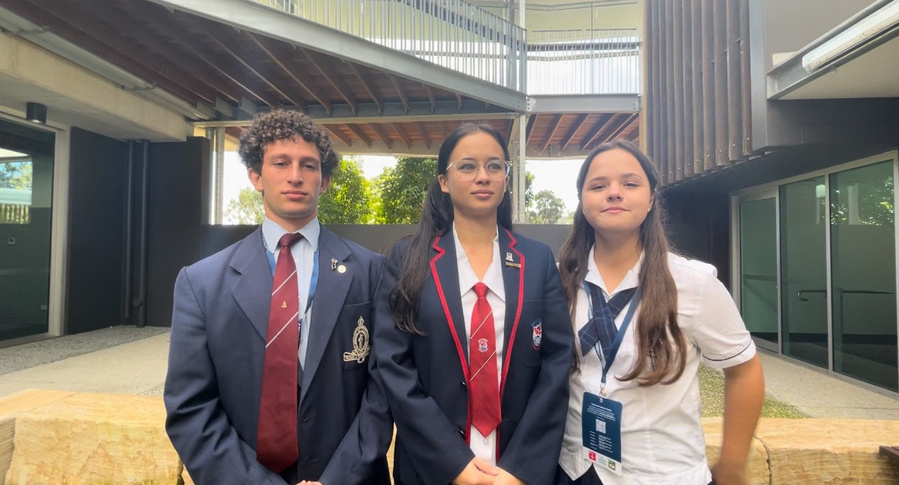
“That feels like communism” Thailand and Turkey propose climate taxes
BY Molly Crocket, Tom Harris, Nicholas Hammett and Lucy Matus
Proposals by Thailand and Turkey to introduce taxation for climate support have ignited heated debate, with the Spanish delegate suggesting such taxation policies mimic communist ideals.
Thailand proposed nations consider a carbon tax to help achieve a low-carbon economy.
Turkey also proposed a tax on all nations’ to be put towards a climate fund, aimed at supporting developing countries towards sustainable energy and incentivising governments to accelerate their use of renewable energy sources.
However, some countries are unhappy with the proposed tax plans, seeing it as “Communist” and wonder at the uncertainty of the fairness and effectiveness of these schemes.
While some countries argue such taxation is necessary to fund crucial environmental projects and incentivize sustainable practices, others caution against imposing burdens that could hinder economic growth and exacerbate poverty.
Hungary criticised the idea of climate tax, arguing that economies could be harmed. The Hungarian delegate stated that nations such as Indonesia could be overly harmed by taxation on key industries such as oil, gas, rubber, and coal. The Netherlands also argued proposed tax plans would interfere too much with ongoing support for developing countries as well as their plans of funding development of mitigation strategies on sea level increases.
Some poorer nations say the proposed tax would not be effective as their contribution would do little to stimulate growth in renewables and may adversely affect their development.
Many commented that solutions should prioritise collaboration, technology transfer, and financial support to ensure that the burden of climate action is shared equitably and does not impede the progress of developing countries.
“We don’t think developing countries need the incentive, they need the resources” said the South African delegate.
Germany and Serbia disagree
BY Chloe Harris and Ayati Gor
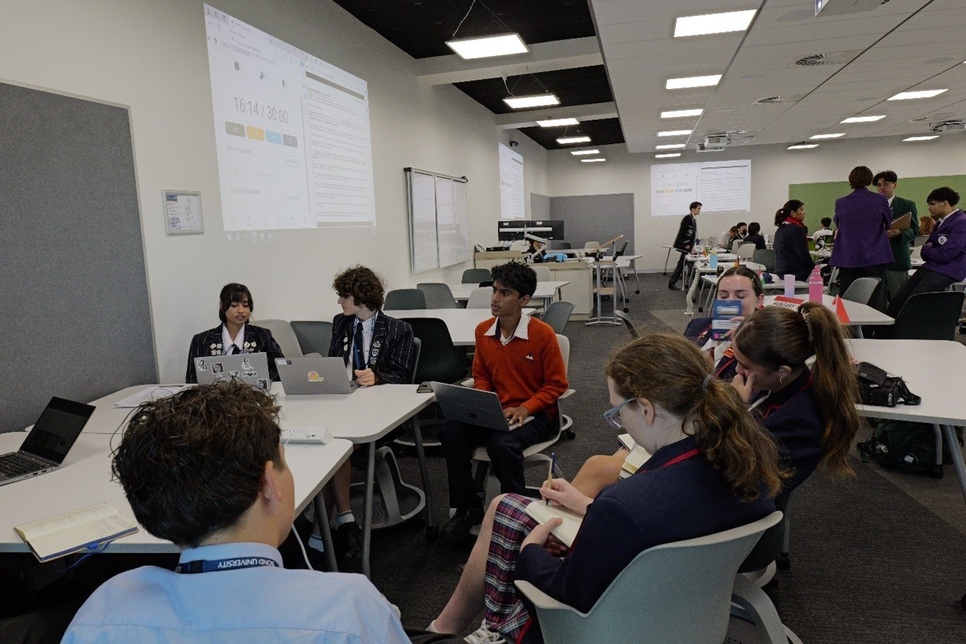
The Serbian delegates opposed attempts by Germany for greater international collaboration on climate change.
The German delegates focused on the inclusive side of the agenda and what their country can provide and were happy to collaborate with the delegates.
Germany voiced their aim to collaborate with other nations; this evidently affected other nations judgment of Germany, impacting their decisions in the conference room.
Other nations said their signatures on the petition to eliminate Germany from the conference room, was driven by the views of the German delegate.
“We signed the petition because the [German delegate] was annoying us” stated a Brazilian delegate.
However, the German delegates believed they were finding reasonable and equitable solutions to the problems all nations face.
“I am just passionate” stated the delegate for Germany “climate change is a global issue and should be solved with a global solution not an independent one”.
However, the Serbian delegates were opposed to the idea of increased collaboration as they believed it would diminish the integrity of the nation.
This disagreement between the two nations ignited the rivalry between the delegates which led to the creation of the petition.
Ultimately the petition against Germany was overturned by the chair.
LEVI KNIGHT - JOURNALIST PROFILE

Journalism Skills and Experience
From 2021, I have coordinated the student news program at Benowa State High School, Redback News. In this role, I manage the news team, and lead a regular 30-minute pre-recorded news bulletin and regular morning news updates.
From the beginning of 2023, I have fortnightly completed work experience with Nine Gold Coast News, shadowing reporters, learning from the team and gaining practical journalism skills. Most recently, I completed a two-week internship with Nine News Queensland in Brisbane. I gained valuable skills learning about different aspects of broadcast news from experienced professionals.
I can confidently create a video news package, conduct and prepare interviews, present a live cross, write scripts, and work actively to create a news bulletin.
Future of Journalism
Social media and the internet are rapidly growing platforms for news and I believe this will grow in time. This also presents its own set of challenges though, the biggest being misinformation. If people have access to information at their fingertips... they also have access to misinformation just as easily. I believe in the modern world and moving forward journalist need to combat the emerging information and act as reliable people to give news the public can trust.
News Awareness and Interest
Recently, I was most invested in the defamation case against Network 10 brought by Bruce Lehrman. I believe this case gained my interest because of the complexity, as well as appealing to my high interest in justice, law, and of course journalism.
Having a love for court reporting and political journalism myself, this case was a perfect combination of my interest. Because the matter had not been proven by a court, Mr Lehrman was innocent until proven guilty. In response, Mr Lehrman sued Lisa Wilkinson (therefore Network 10) for defamation. Due to the basic principal “it isn’t defamation if it is true”, becoming the trial’s focus. The judge finding on the balance of probabilities (as all civil proceedings are held against) Mr Lehrman raped Brittney Higgins, stating, “Having escaped the lion’s den, Mr Lehrman made the mistake of coming back for his hat”, a statement I believe perfectly summarises the situation.

STUDENT NEWS

DAY 1
5PM EDITION
BUHMUN BEGINS for 2024
More than 250 high school students and their teachers from across Australia have gathered on the Gold Coast to attend the eighth annual Bond University High School Model United Nations (BUHMUN).
Chloe’s words of wisdom
Chloe Burns was the keynote speaker at this year’s Bond University’s High School Model United Nations (BUHMUN). She gave her insights to high school delegates on what to expect during the two day event at Bond University
Former Bondy speaks to the BUHMUN Security Council
Security Advisor, Charlie Baldry, spoke with the BUHMUN Security Council on climate change and the rise in geopolitical tension.
BUHMUN begins for 2024
BY Bianca Uccellini and Ayati Gor
More than 250 high school students and their teachers from across Australia have gathered on the Gold Coast to attend the eighth annual Bond University High School Model United Nations (BUHMUN).
The two-day conference encourages and inspires future diplomats and journalists, preparing them to become the leaders of tomorrow.
Students from as far north as the Whitsundays and as far south as Inverell came to discuss issues of global importance.
BUHMUN coordinator Dr Mark Dinnen said the event strives to empower young people during their pursuit of becoming the world’s next leaders.
The conference features four committees, with 30 countries being represented, discussing Sustainable Development Goals (SDGs) 10 and 13, reduced inequalities and climate action, respectively.
These SDGs focus on finding equitable solutions to combating the impacts of climate change as well as the importance of reducing inequalities within countries.
Each committee focuses on a specific element that contributes to achieving these goals.
The conference is being reported by BUHMUN’s journalism team, updating students, teachers and chairs on the event and committee workings.
Dr Dinnen said he hoped the conference inspired change.
“My generation dropped the ball,” he said. “I aim for BUHMUN to give hope that you can be the future leaders of tomorrow.”
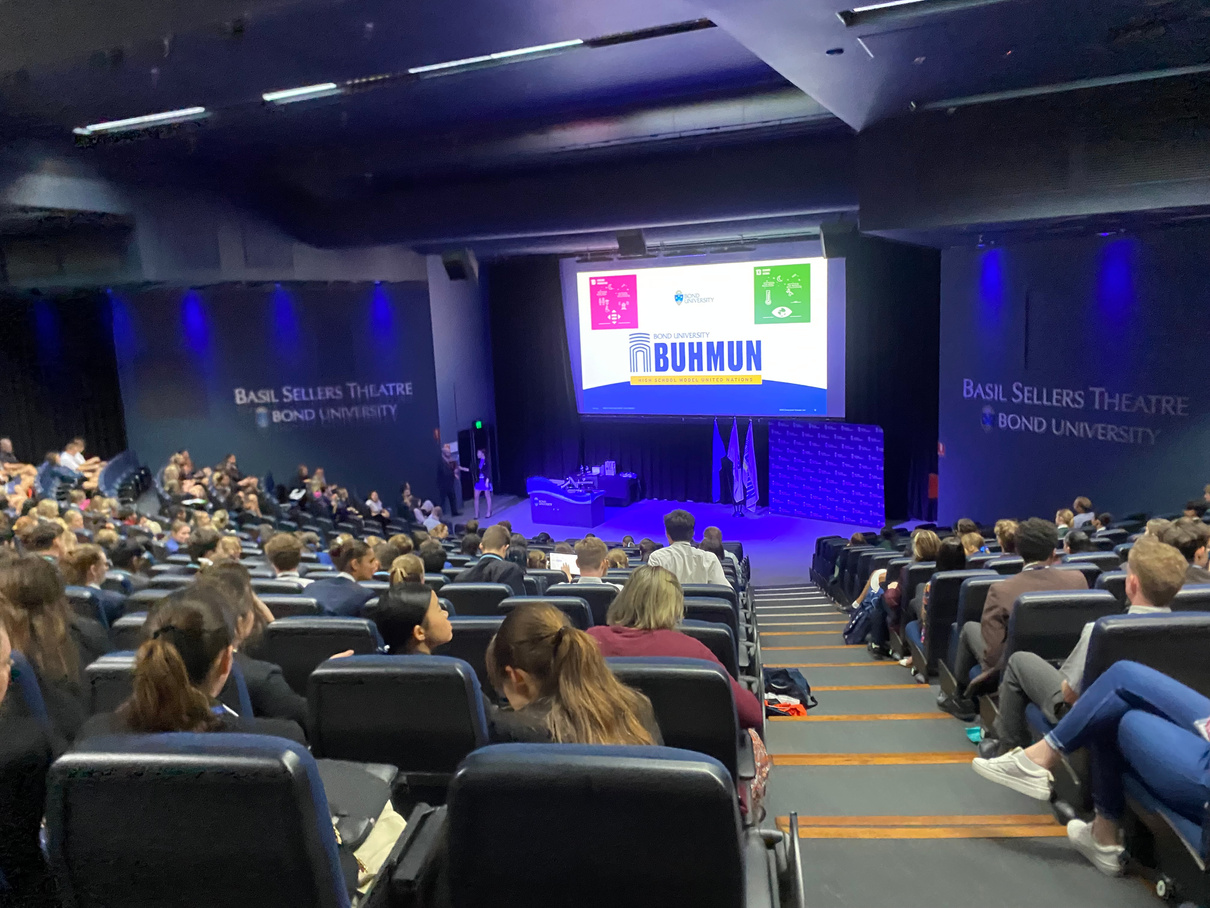
Chloe’s words of wisdom for BUHMUN delegates
BY Lucy Matus and Will Bailey
Chloe Burns was the keynote speaker at this year’s Bond University’s High School Model United Nations (BUHMUN).
She gave her insights to high school delegates on what to expect during the two day event at Bond University.
The conference is focusing on the rising danger of climate change and global conflicts, and Chloe shared her wisdom on understanding cultural differences.
On Tuesday morning Chloe shared key past experiences including her time overseas and on her current role as Operations Coordinator for the Decisive Point.
As an international student in Seoul, she experienced first-hand the rising tensions between North and South Korea.“

“The people of South Korea are very divided between helping or cutting off North Korea.” Ms Burns said.
She also emphasised the importance of communication around national security.
“It informs so much of their daily life...It’s a taboo topic … but I found it really fascinating in an academic setting hearing people first-hand give their experiences.” Burns said.
Burns’ observations of the rising tensions between some countries reflects the importance of cultural awareness.
Having different conversations around conflict, provides ways on finding and communicating solutions.
As the coordinator at The Decisive Point, Chloe mediates discussions between defence forces.
Her role forces her to step well out of her comfort zone on many occasions to meet the expectations of others.
“You are constantly being pushed outside your comfort zone...I would be asked sometimes to give half of the presentation talking to fifty plus year olds with thirty years’ experience in defence and they know what they are talking about.” Burns said.
Burns’ emphasis on communications, has provided the delegates of BUHMUN a perspective on global conflicts and climate change.
Former Bondy speaks to the BUHMUN Security Council
BY Thorne mcdonald and allegra nutley

Security Advisor, Charlie Baldry, spoke with the BUHMUN Security Council
Security Advisor, Charlie Baldry, spoke with the BUHMUN Security Council on climate change and the rise in geopolitical tension.
Ms Baldry graduated from Bond University with an International Relations and Business degree in 2023 and was a guest speaker at the first day of BUHMUN 2024.
Charlie told the Security Council “climate change is a potent catalyst” and urged them to think of climate refugees in their resolutions and debates.
Charlie Baldry is the Chief of Operation Support at Decisive Point.
Her love for international relations started when she was at school on a school trip to Nepal where they helped devastated communities.
She attended Bond University and was awarded a place at the Japan Model United Nations which is supported by the New Colombo Plan scholarship.
Charlie loved living on campus for two out of her three-year program. It was this two year stay that prompted her to “jump at the chance to return to Bond”.
Turkey’s opening statement ignites tensions
BY Molly Crockett, Tom Harris, Lucy Matus, Nicholas Hammett
Turkey’s opening remarks to the Committee on Climate Finance and Reducing Wealth Disparities made their agenda clear - they would be seeking to achieve more sustainable energy sources and lower carbon emissions whilst not crippling their economy.
The delegate stated that Turkey does not have the ability to meet the 2015 Paris Agreement’s margins of an increase of 1.5oC in global temperature, given their reliance on coal for energy and as an export.
Their proposal to reduce their coal consumption was to call on Ukraine to be an energy donor.
“Turkey requires dependence. Turkey requires assistance from other nations, especially the nation of Ukraine and other allies of Turkey.” the delegate told the session.
When interviewed, the delegate stated that Turkey felt Ukraine should support Turkish energy developments due to their support of machinery and armaments supplied to them in the Russo-Ukrainian war.
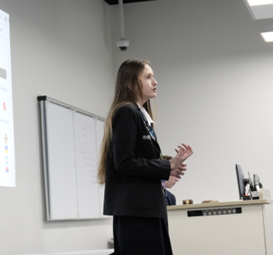
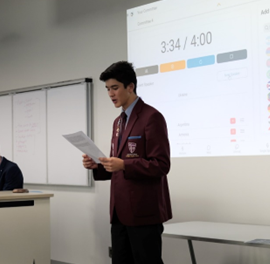
Turkish Delegate
Ukrainian Delegate
However, Ukraine’s current issues with defending themselves from Russian attack is a daunting reality for both countries.
Ukraine recognised the importance of climate change as an ongoing issue for Turkey and supports Turkey’s decision to ask for aid.
However, Ukraine states that they are in no position to allocate their finances or resources towards environmental aid for other countries because of the ongoing war with Russia, suggesting that Ukrainian safety currently is a more important issue.
“We feel that the issue with the climate in Turkey are not as prominent as the current issue of the Russian invasion of Ukraine. Sure, climate change will result in the deaths of people in the generations to come, but currently the Russo-Ukrainian war is resulting the deaths of many Ukrainians daily. We would like to pledge our support for Turkey in the sense of supporting climate change and climate activism, but at this current stage, Ukraine has issues at home to deal with before looking abroad” said the Ukraine delegate.
Other delegates supported Ukraine’s goals. The ECEU countries -Ukraine, Armenia Serbia, Hungary, and Latvia - defended Ukraine.
Latvia stated that the ECEU stands against Turkey’s proposals of drawing energy from Ukraine, as they see it as a direct attack upon Ukraine’s infrastructure in the wartime period.
“War against Ukraine means war against us all” –said the Latvian delegate on behalf of the ECEU.
Turkey’s position has ignited tension with the ECEU nations. The issue is ongoing and may be revisited later at the conference.
A slow start to proceedings
BY Jayden Joury and Andre Duque
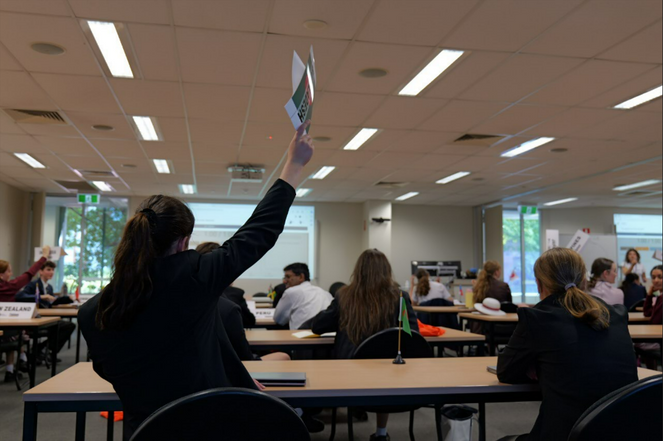
Proceedings delayed as European nations voice concerns for economic burden of increased refugee intake
Delegates in Committee One of the 2024 BUHMUN conference expressed frustration with the slow start to proceedings.
As member-states of the UN discuss climate-induced displacement and refugee rights, the question of whether a consensus will be reached before the conclusion of proceedings hangs in the balance.
Major European countries including Spain, Germany, and Latvia have taken the stage while other states have been forced to take a back seat on the refugee crisis.
Will the committee reach an agreement with negotiations proceeding at a snail’s pace?
BUHMUN journalists interviewed the Spain and Germany delegates regarding climate induced displacement and refugee rights and were told Spain and Germany believed they had a larger influx of refugees and therefore it costs them more economically.
Both countries contend that the financial burden associated with accommodating refugees is substantial.
“The responsibility of developed European countries such as Spain and Germany to take in a larger influx of refugees has a more dire impact on the internal dynamics of the country which usually has negative implications for the country’s economic wellbeing.” the delegate for Spain said.
They also felt the first agenda item of opening statements was a tedious process given the delegates’ passionate stances regarding the issue.
The calm before the storm
BY Gabby Schubert
The main discussion on the agenda in Committee Room 3 this morning was climate change and mitigating strategies.
Following the Paris Agreement, the United Nations has prioritised its Sustainable Development Goal number 10, aimed at reducing the impact of climate change.
The delegate for the Czech Republic opened the session, stating that ‘climate change poses an existential threat to humanity, and the window for decisive action is rapidly closing.
The Russia-Ukraine conflict has influenced the rise of coal usage globally.
The Czech Republic is committed to upholding the Paris agreement of carbon emission and climate change. ‘[We] hope the world community assists economically and politically to aid the Czech Republic in reducing carbon emissions.’
The delegate for Hungary, stated that ‘Hungary’s main energy resources come from our natural gas, and coal. We see the importance to change this, but also see the effect that this [the reduction of the use of coal and natural gas] has on our country’s economy.’

In comparison to Hungary’s relatively tentative approach, the delegate for Peru, Mr. Perkins, said Peru is ‘ready to take on this challenge to ensure a safe environment for future generations’.
The Ukrainian delegate, Ms. Doroshenko said the ongoing conflict with Russia is a driving factor in the increase of global carbon emissions but claimed that Ukraine faces chemical and explosive contamination of nearly 50% of its territory.
The Armenian delegate, Mr. Adar has whole-heartedly accepted that his eastern European nation has played a large role in the climate crisis, a sentiment not previously spoken on by other delegates, and stated that ‘Armenia is committed to the reduction of our country’s carbon emissions’.
By the end of the first session, most delegates had spoken on the effects of climate change on their countries, leaving room to engage with collaborative work towards meaningful change in the coming sessions.
China ruffles feathers over net zero
BY Ruari Wan
China accused countries in the Security Council of unattainable climate aims as they struggle to meet their own goals.
This was countered by the Guyana delegate who explained how they have completed their goals.
The Chinese delegate said its inability to sustain net zero is due to a reliance on factories and plants.
Guyana is a tiny coastal nation who can limit their emissions very quickly and suggested China should be able to accomplish their net zero goals.
“China believes the current goals are unrealistic because of their massive industrial-based economy but countries like Cambodia, Madagascar and ourselves have already achieved net zero.” said the delegate from Guyana.
Guyana is continuing to expand on its net zero goals by communicating with countries such as Switzerland and France hoping to reinforce the realistic ideals of the goals.
“We cannot sustain a net zero goal due to our industrial-based economy.....not every economy is the same, yet Guyana seem to think so...” said the Chinese delegate.
China defined the term ambitious as ‘unrealistic often leading to a country reneging or cancelling a goal’.
“We need tangible solutions and more nuanced goals” China said.
China’s delegates are fighting for each country’s independent economy to be judged as different. Guyana believes that everyone should be able to achieve their goals no matter how ambitious.
More details to this important topic later in the conference - stay tuned for further developments.
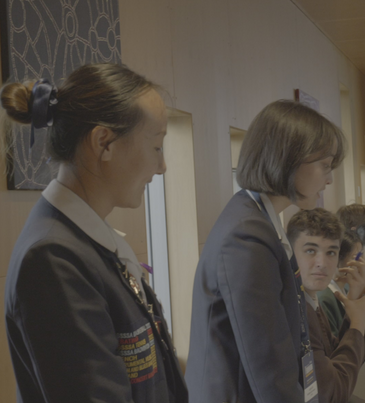
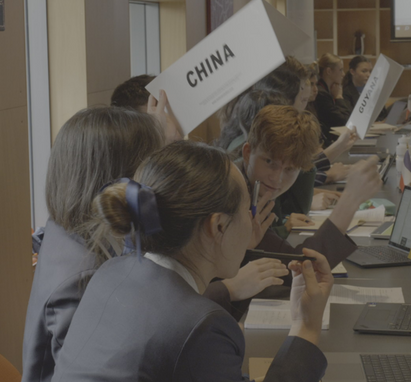
Chinese delegation in heated argumentative discussion surrounding the climate crisis.
Chinese delegation and Guyana delegation both raising their name cards for a motion.
Germany and Serbia’s conflict
BY Beau Keating and Chloe Harris
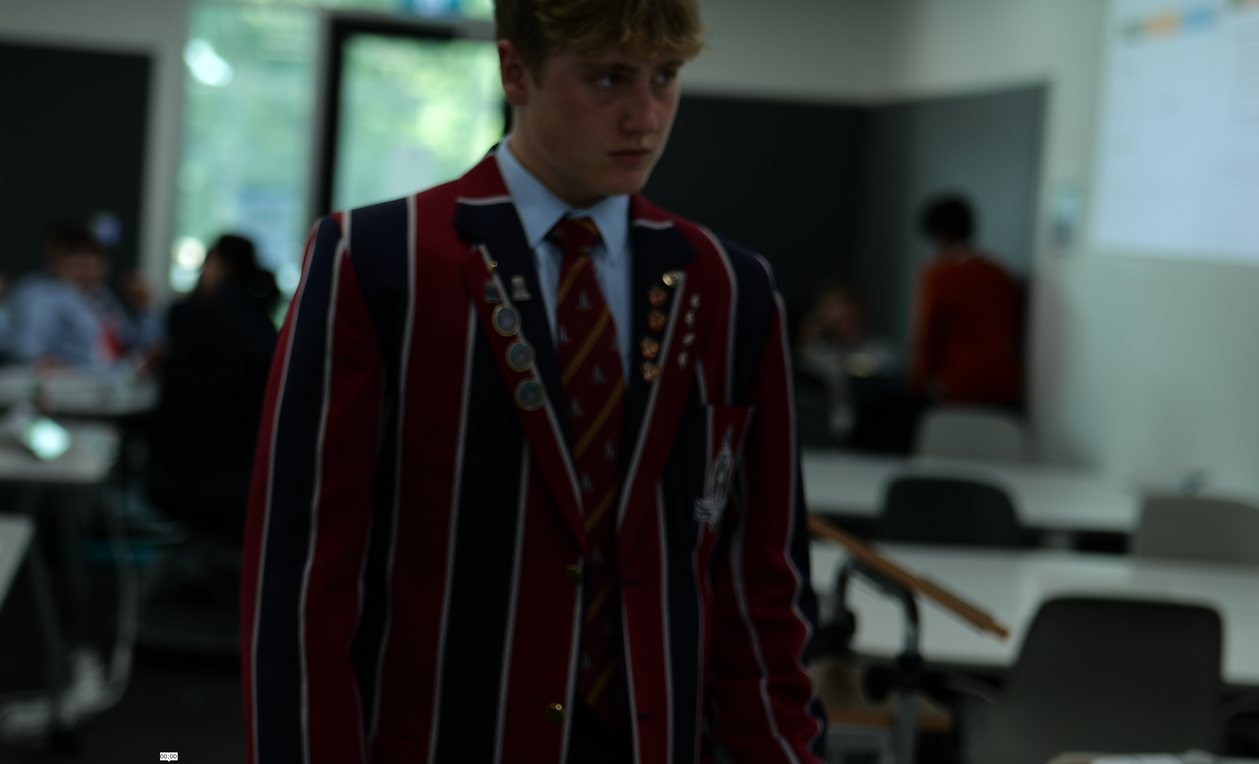
German Delegate
Today the model UN delegates gave their opening statements regarding investment in renewable energy, equitable climate policies, and inclusive strategies.
Delegates discussed reducing the impact their countries have on the environment along with asking for the support of others to combat climate change.
Countries, including Germany and Japan, said they wanted to collaborate and support smaller countries in implementing sustainable practices. Other countries including Spain and Serbia took a particular focus on inclusive strategies.
Although many of their interests overlap, it appears there may be a conflict in interest between some of the countries. Germany made it abundantly clear that their path forward involved collaboration between all countries.
"As the federal Republic of Germany, we are very open to collaboration." said the German delegate.
This sentiment was echoed by South Africa. "Climate change is a global problem, so it should be a global solution." said its delegate.
South Africa suggested nuclear programs as an aid to build up their sustainability.
In exchange, they would allocate South African scientists to work on environmental solutions. Serbia however agreed that collaboration is necessary to work towards a solution but stated that there is a limit to how much they are willing to collaborate.
"Our focus is collaboration, to an extent." said the Serbian delegate.
There appears to be a point of contention between Germany and Serbia. "If there's countries that don't want to help others, they're not going to get our support." the German delegate declared.
Serbia believes it isn’t capable of contributing to the development of other countries. "There is importance in such programs but we ourselves cannot provide such." said the Serbian delegate.
This has the potential to divide countries as they disagree on what is an acceptable level of collaboration. As BUHMUN continues these two countries are likely to grind against each other.
back to top